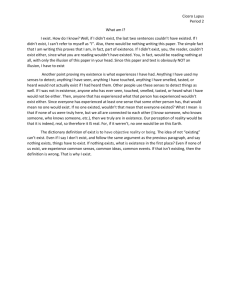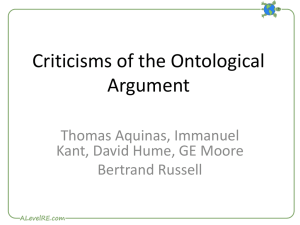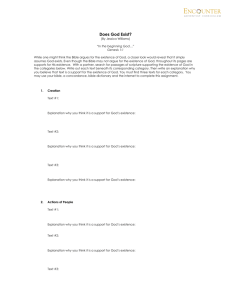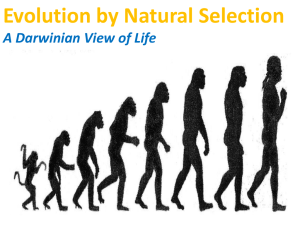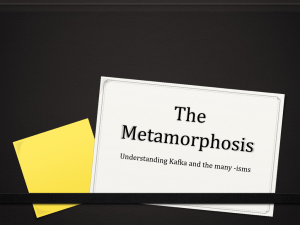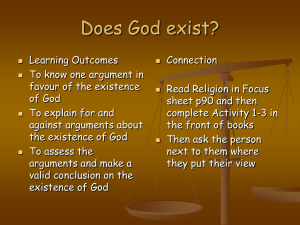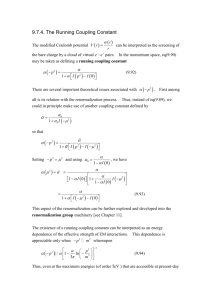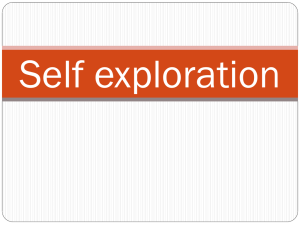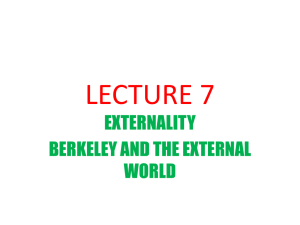Insight Paper by J.P.
advertisement
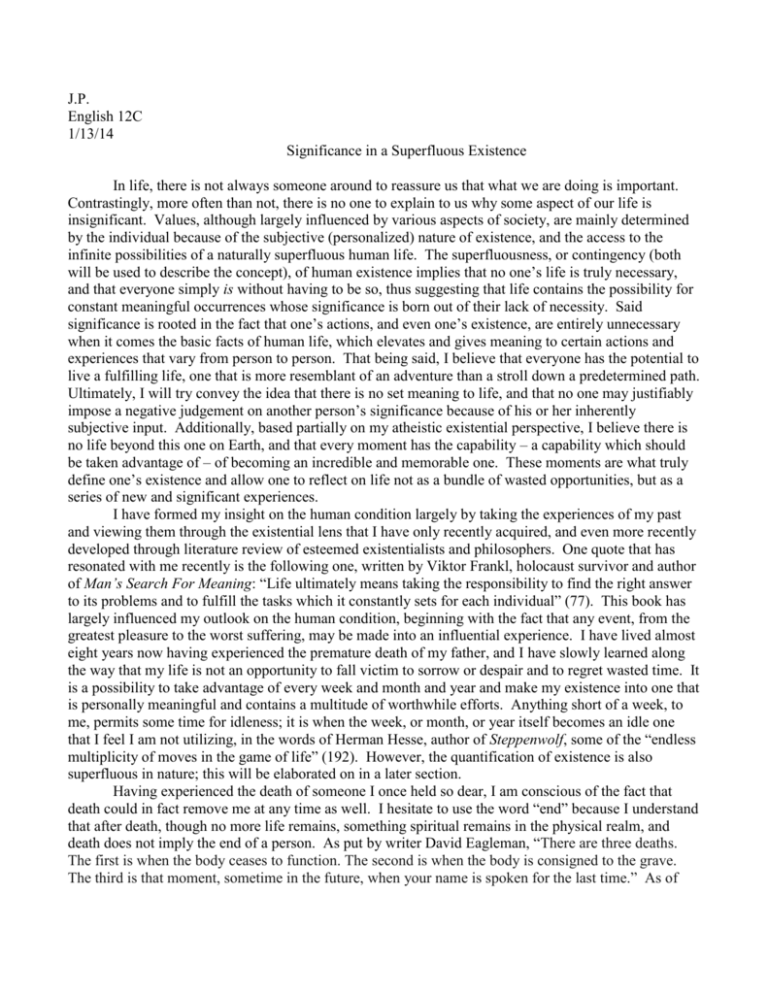
J.P. English 12C 1/13/14 Significance in a Superfluous Existence In life, there is not always someone around to reassure us that what we are doing is important. Contrastingly, more often than not, there is no one to explain to us why some aspect of our life is insignificant. Values, although largely influenced by various aspects of society, are mainly determined by the individual because of the subjective (personalized) nature of existence, and the access to the infinite possibilities of a naturally superfluous human life. The superfluousness, or contingency (both will be used to describe the concept), of human existence implies that no one’s life is truly necessary, and that everyone simply is without having to be so, thus suggesting that life contains the possibility for constant meaningful occurrences whose significance is born out of their lack of necessity. Said significance is rooted in the fact that one’s actions, and even one’s existence, are entirely unnecessary when it comes the basic facts of human life, which elevates and gives meaning to certain actions and experiences that vary from person to person. That being said, I believe that everyone has the potential to live a fulfilling life, one that is more resemblant of an adventure than a stroll down a predetermined path. Ultimately, I will try convey the idea that there is no set meaning to life, and that no one may justifiably impose a negative judgement on another person’s significance because of his or her inherently subjective input. Additionally, based partially on my atheistic existential perspective, I believe there is no life beyond this one on Earth, and that every moment has the capability – a capability which should be taken advantage of – of becoming an incredible and memorable one. These moments are what truly define one’s existence and allow one to reflect on life not as a bundle of wasted opportunities, but as a series of new and significant experiences. I have formed my insight on the human condition largely by taking the experiences of my past and viewing them through the existential lens that I have only recently acquired, and even more recently developed through literature review of esteemed existentialists and philosophers. One quote that has resonated with me recently is the following one, written by Viktor Frankl, holocaust survivor and author of Man’s Search For Meaning: “Life ultimately means taking the responsibility to find the right answer to its problems and to fulfill the tasks which it constantly sets for each individual” (77). This book has largely influenced my outlook on the human condition, beginning with the fact that any event, from the greatest pleasure to the worst suffering, may be made into an influential experience. I have lived almost eight years now having experienced the premature death of my father, and I have slowly learned along the way that my life is not an opportunity to fall victim to sorrow or despair and to regret wasted time. It is a possibility to take advantage of every week and month and year and make my existence into one that is personally meaningful and contains a multitude of worthwhile efforts. Anything short of a week, to me, permits some time for idleness; it is when the week, or month, or year itself becomes an idle one that I feel I am not utilizing, in the words of Herman Hesse, author of Steppenwolf, some of the “endless multiplicity of moves in the game of life” (192). However, the quantification of existence is also superfluous in nature; this will be elaborated on in a later section. Having experienced the death of someone I once held so dear, I am conscious of the fact that death could in fact remove me at any time as well. I hesitate to use the word “end” because I understand that after death, though no more life remains, something spiritual remains in the physical realm, and death does not imply the end of a person. As put by writer David Eagleman, “There are three deaths. The first is when the body ceases to function. The second is when the body is consigned to the grave. The third is that moment, sometime in the future, when your name is spoken for the last time.” As of my father, the first two deaths have long occurred, and they have impacted me on a profound level. However, I will never experience the third death, and I do not believe it will occur for several generations. This third death is always avoidable, and whether or not one chooses to make it so is constantly up to him or her. Consider men like Isaac Newton, George Washington, Martin Luther King Jr., Babe Ruth, or women like Amelia Earhart, Susan B. Anthony, Eleanor Roosevelt, Marie Curie; their third deaths will almost certainly never occur because of the eternal impact they have had on the global societies that humans have created. The contingency of human existence is an incentive to prolong, or to remove the possibility of, the third and final death of a person. To return briefly to the Frankl quote, it may at first seem contradictory to assert that life constantly requires tasks to be met, and problems to be solved, by individuals, while simultaneously arguing that life is in itself meaningless. However, the very fact that human societies constantly require tasks to be met, without at all being a necessary part of existence on Earth, shows that there is some reason for their being. In other words, there are a countless number of roles and obligations that exist, but surely do not have to in order for life on Earth to temporarily continue: the parent, the scientist, the teacher, the lawyer, the athlete, the banker, the pilot, and so on. It is not a universally accepted idea that “lawyer” should be an occupation, but within the humanly created system that is developed to the point of irreversibility (no American politician would disband the capitalist economy), lawyers play an essential role in keeping the cogs spinning, so to speak. Additionally, it is likely that many lawyers see law as a useful, fulfilling practice, whereas others may think that the judicial system itself is a waste of time and effort. This is merely one example to suggest that meaning may be born out of the absence of necessity; it also demonstrates that humans inherently have differing opinions and values because of the subjective nature of the human mind. Subjectivity implies that some form of opinion or personal perception will always influence the way one arrives at conclusions, such as what constitutes a meaningful existence. This subjectivity is what led me to originally suggest that life may resemble an adventure: because nothing is ultimately necessary, as I have explained previously, anything becomes a possibility. No one is born and immediately develops thoughts about why they want to grow up to build houses, or create energy, or teach high school students. These thoughts and inclinations are developed over time, and can continually vary right up until one exits the physical world. Antoine Roquentin altered his vocation from a historian to a novelist throughout the course of Nausea, by Jean-Paul Sartre, because of his continually developing outlook on his existence. When he arrives at the conclusion that his existence is superfluous, and that nothing he does truly matters in the end, he stops studying into the past and begins creating for the future, diminishing the likelihood of his third and final death while providing for himself a consistently fulfilling action. He sums up the concept of life’s contingency quite nicely numerous times, including here: “One cannot define existence as necessity. To exist is simply to be there... [men] cannot succeed in not feeling superfluous” (131). For Antoine and myself, this superfluousness is what sparks some incentive to leave behind something that proves that we have existed and contributed to this world that each individual is born meaninglessly into. The contingency of existence provides an opportunity to focus on each day as a completely new one with infinite possibilities packed between the rhythmic ticks of the clock. This machine is the only limiting factor in life: time should be both constantly acknowledged and yet disregarded whenever possible. The quantification of existence is in itself superfluous; there is no reason to organize a cycle of the senses (the basic functions of survival). However, given the extent to which human society has developed, a method of quantifying life has become necessary to organize the series of events that compose our lives. I say one must pay attention to it because without it, one cannot exist as a functioning member of society (being so is necessary to do many societally important things, from attending school or work to receiving medical attention that may make the difference between life or death). However, it should be disregarded when possible because of its unnecessary nature: who needs to think about yesterday or tomorrow when the only relevant moment is now? This does not suggest that the future should be entirely neglected as unimportant, but the majority of one’s attention should be placed into the present moment rather than overanalyzing events that have already occurred or not yet occurred. For example, on a Saturday night, a teenager might certainly and justifiably devote their attention to engaging in whatever will give them immediate satisfaction and release from a week’s work. However, come Monday morning, that teenager should devote their attention to accomplishing the tasks laid before them in school, for these are their immediate obligations and the ones that will also likely benefit their future in some way. Time, although not necessary for basic life, must be regarded in modern human society to both provide instantaneous pleasure as well as build a foundation for longterm fulfillment. To return briefly to a personal anecdote, my father’s death has in no way diminished my own will to develop meaning and fulfillment in my life. He died when I was only 10; I had very little comprehension of life and its extensiveness in terms of the fact that, once again in the words of Antoine Roquentin, “Anything can happen, anything” (77), including the death of someone I loved so dearly. However, his life was evidently not necessary: I am still alive and well, as are my family who were also deeply afflicted by this permanent wound in the heart. In fact, I have viewed my own life as less necessary and yet more filled with meaning because of the lack of his presence. If I were to die tomorrow, the lives of those around me would continue on, regardless of whether or not they were affected by my death. The same goes for everyone... death simply implies the removal of the physical aspect of one’s being from the Earth. All accomplishments will not have been for nothing. They will represent what once was, and for me, that is an incentive to constantly pursue and engage in what I believe to be meaningful. Those who view their lives as unnecessary in this manner will achieve a sense of personal motivation that will allow them to see meaning in various aspects of their existences. He (and of course, she) who attempts to make the most out of every fleeting moment of his life will be able to reflect upon it as a mosaic of beautifully connected experiences. He will lie down on his deathbed not with a sense of fear or regret, but of contentment and satisfaction with what he has made with his short time on Earth. Works Cited Eagleman, David. Sum: Forty Tales from the Afterlives. New York: Random House, 2009. Print. Frankl, Viktor. Man’s Search for Meaning. Boston: Beacon Press, 2006. Print. Hesse, Herman. Steppenwolf. New York: Picador, 1963. Print. Sartre, Jean-Paul. Nausea. New York: NDP 1073, 2007. Print.

